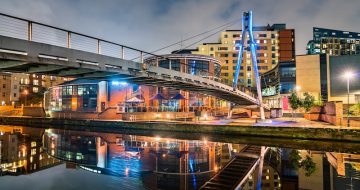Ross Nelson, a law conversion student at The University of Law, shares his insider take on student life in London — revealing the highlights of his course, his top tips for making the most of the City, and how he juggles academic demands with life beyond the books

Have you ever wondered what it would be like to study law in the heart of the UK’s capital city, minutes away from the nation’s top law firms and biggest businesses? Look no further!
Ahead of our upcoming event ‘Secrets to Success London — with Farrer & Co, Pinsent Masons, Reed Smith and ULaw‘, taking place in-person at The University of Law‘s London Bloomsbury campus, we sat down with ULaw student ambassador Ross Nelson to find out what it’s really like studying on one of the university’s central London campuses.
What first motivated you to study the law conversion at the University of Law?
My interest in pursuing a law conversion course developed during my undergraduate degree at the University of Exeter, where I studied International Relations and Russian. Whilst the course itself was interesting, I struggled to see where it would lead me in the long term, knowing that I wanted to focus on something more practical than theoretical. This is when I was first introduced to the PGDL, speaking with the University of Law team in Exeter, one of their partner universities.
The idea of converting to law excited me, but I decided to hold off for a couple of years to gain work experience and let the aftermath of COVID pass. Three years later, I was still just as interested in converting, so I decided to enrol. Although I took the time to consider several providers, I found that ULaw had a particular reputation for its employability services, which is most important to me at this stage in my career. I additionally had numerous friends who had completed the PGDL across ULaw’s campuses and always had good things to say about the teaching and student experience.
What’s the best thing about campus life at ULaw, London Moorgate?
Studying at the Moorgate campus in London was something that drew me to ULaw. The campus itself is very modern, clean and neighbouring many of London’s largest law firms, so you do feel inspired when you walk around the area. The transport links are also great, with every major tube line a stone’s throw away. This makes the commute to university very convenient and equally makes it easy to get around the city if you’ve got commitments after a workshop.
The Moorgate campus is for postgraduates only, which I also enjoyed, as everyone is at the same stage of their studies. There are always places to sit and study on campus, but there are also several coffee spots around where you can set up shop. The only drawback is that Moorgate is a very commercial area, so there are a lot more chains than quirky independent spots, but this does make it very practical and means that there’s a lot of choice around.
What has been your favourite topic/module on your course? And why?
My favourite modules so far have probably been either Criminal or Tort law. Whilst each module offers its unique appeal, as someone who had not studied law in the past, I found these particularly accessible. This is likely because they are more focused on individuals and grounded in real-world scenarios. I particularly enjoyed the workshop group tasks in these modules, which often involved two opposing teams representing the claimant/defendant and coming up with creative solutions to complex problems. I enjoyed interpreting legislation in light of a specific fact pattern, and there’s always a thrill when you successfully bring a claim against someone or defend your client. I also felt that these modules are the easiest to seep into your real life, given that both criminal and tort cases are so often reported on the news.
What was the biggest challenge you faced on your course?
Anyone will tell you that the conversion course is fast-paced and intense, but there are certainly times when I felt this more than others. The workload was particularly evident during the month leading up to exams, which overlapped with many deadlines for training contracts and vacation schemes. For me, balancing both these things was very difficult and time-consuming, so I made the active decision to prioritise my exams over anything else. Obviously, everyone works in different ways and will have their priorities, but for me, it was important to put my energy into the course. I have found that the work I put into studying was reflected in my results, but this did come at the expense of missing an application deadline or two.

What do you do outside of your studies? How do you find time to fit in all your commitments?
Outside of my studies, it has been important for me to maintain a social life and meet up with friends and family. This has been more challenging whilst studying the conversion course, but it is by no means impossible and important when spending so much of my time studying. By giving myself a routine and schedule, I have always found the time to do what I enjoy, which equally gives me the time to recharge. Finding the time to exercise, whether running or playing tennis, is also something I have found easy to balance with the demands of the course, especially as much of my time is spent studying from home, so it is a great way to break up the day.
What has the academic and pastoral support at ULaw been like?
The support at ULaw has generally been very good. I have found all my teachers very approachable and have scheduled one-to-one meetings with several of them when I have had trouble with a certain topic. Equally, the pastoral support has always been great. The university often promotes its wellbeing services, meaning students very much know where and who to go to if they need help with anything. Aside from this, I’ve personally found both the employability and library teams very helpful with my own academic and professional development, with everyone I’ve spoken to being eager to help.
What are your plans for the future?
In the future, I hope to qualify as a solicitor, so I aim to secure a training contract and complete the SQE. Being in the heart of the city has been very convenient in terms of going to law firm open days or networking events, so I have managed to get a good understanding of the firms that interest me most. Once my course concludes in August, I aim to spend time applying to winter vacation schemes and paralegal roles. I am still not set on a particular area of the law, but thanks to the course, I have a much clearer idea of the legal landscape and what range of work different areas of law entail.
What would be your advice to someone about to start the law conversion course at ULaw?
Studying law for the first time can be daunting, especially in such an intense setting; however, it is equally very rewarding if you make the most of it. My advice would be not to worry if you don’t understand something at first, and remember that everyone else is in the same boat. I found the first few weeks overwhelming, but things soon started to fall into place. Getting into a routine and taking good (revision-worthy) notes from the outset makes all the difference, as you will soon realise there is no time to do this during exam period.
Given the quantity of material to learn, I would also say it’s imperative to keep on top of the required reading each week and not feel afraid to ask your teacher or workshop group questions if you don’t think you understand something. But most importantly, try to remember to give yourself room to breathe when you can; it is a lot of studying, but this means it’s equally important to recharge your brain when you get the chance.
Legal Cheek will be at The University of Law’s London Bloomsbury campus this week for an in-person student event ‘Secrets to Success London — with Farrer & Co, Pinsent Masons, Reed Smith and ULaw‘. This event is now FULLY BOOKED, to see more of our events, check out our upcoming events schedule.
About Legal Cheek Careers posts.


